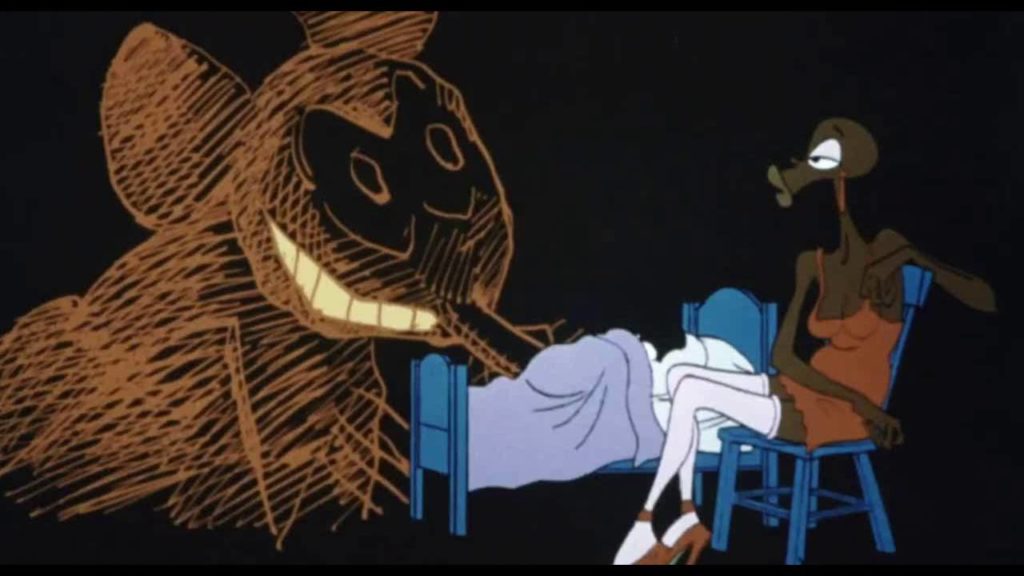
In 1946 Walt Disney released Song Of The South, a musical adaptation of Joel Chandler Harris’ Uncle Remus stories. The structure of Song Of The South, live action scenes of the storyteller bookending animated sequences of the stories told, provided the blueprint for Ralph Bakshi’s film Coonskin (1975). But Bakshi’s purpose is to satirize the Disney film by focusing his narrative on three anthropomorphic characters (Brother Rabbit, Brother Bear, and Preacher Fox) in a uniquely contemporary setting. This correlation between Bakshi’s film and an earlier work, which it is his intention to subvert, recalls the basis of Bakshi’s most accomplished film Heavy Traffic (1973).
Bakshi does not even shy away from satirizing the Black Power movement itself if one recalls the “Black Jesus” scene. Of course, this particular sequence ridicules the militancy of such radical groups as The Black Panthers. Similarly Bakshi designs specific sequences that expose both the ridiculousness and the harmfulness of racial stereotypes such as black face, the exploitation plot device pitting Black gangsters against the mafia (prevalent in both Dolemite and Black Godfather), the rumors policemen used heroin to control African Americans in Harlem, and George Herriman cartoons.
The crudity of Bakshi’s satire was well established with Fritz The Cat (1972), but it is the grotesque nature of his character designs that could perhaps suggest racism on the part of the filmmaker. The best argument against these allegations is that the film’s stars (Barry White, Charles Gordone, Philip Thomas and Scatman Crothers) stood by the film long after it had been released and eventually buried. Today, if one wants to get to the social and political heart of Coonskin, one need only look so far as the scene where Preacher Fox takes Brother Bear out to dinner. In this scene, a live action white couple attempts to compliment Brother Bear’s girlfriend Pearl on how “nice it is that black people can really dress different, I mean we, we always have to dress the same”. Just as Coonskin epitomizes the “Black Experience” in modern American culture, Heavy Traffic epitomized the Jewish-American experience.
However it would be the Coonskin controversy that pushed Ralph Bakshi away from socially conscious films and into the fantasy genre, spawning his two most popular films The Lord Of The Rings (1978) and Wizards (1977). Coonskin’s producer Albert S. Ruddy, who began the seventies producing Francis Ford Coppola’s The Godfather(1972), would go on to strictly commercial fare such as the Burt Reynolds hits The Longest Yard (1974) and The Cannonball Run (1981). By 1976 the milieu of exploitation films that sparked initial interest in Coonskin had dissipated as a result of absorption into the mainstream with films like the Shaft franchise (1971-74), thus ending the hey day of a distinctly American sub-genre in filmmaking.
